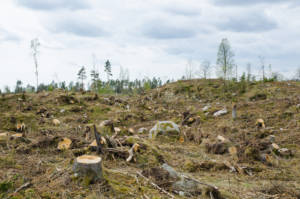Canada is no stranger to deforestation, in which trees are cleared to make land available for non-forest use. The deforestation rate in Canada is 0.02 percent, making Canada a leader in sustainable forest management. Most people believe that deforestation occurs through harvesting trees or forest fires, but the reality is that deforestation only occurs when forests are permanently removed. The government regulates forests on public lands, about 94 percent of the forests in the country. When trees on public land are harvested, the land must be reforested, typically through planting. And it’s not urban development that is the biggest contributor to deforestation. It’s actually converting forested land to agricultural land.
The Unfortunate Truth about Deforestation
The rest of the world isn’t quite as fortunate. Experts report that over 13 million hectares of forest around the world have been cleared to make room for alternative uses. Trees are cut down for many reasons:
- Agriculture – farmers need more land for crops and livestock.
- Logging – trees are cut down for wood and paper requirements.
- Biofuels – palm oil is becoming more popular, and many forests in Malaysia and Indonesia are being harvested to produce this biofuel.
- Fuel – trees are harvested for firewood to heat homes and for cooking.
- Roads and highways – forests are being cut down to make roads.
- Mining – forested areas have a lot of minerals, making them vulnerable to mining operations.
How to Fight Back
The loss of forests contributes to a loss of habitat and an increase in global warming, as well as more erosion and flooding because the trees do not hold the soil down. As a global society, we must do our part to prevent deforestation around the world. We have to:
- Plant more trees
- Put pressure on companies that are destroying forests to manufacture products by not buying from brands that are not eco-friendly
- Reduce, reuse and recycle
- Support non-profit organizations that are fighting deforestation
- Take a stand on political issues
- Look for green products that reduce your use of natural raw materials
The Anglican Church Steps Up in Burundi
Burundi, a small country in Africa, has lost about 22.1 percent of its forest habitats through deforestation from 1990 to 2005. The government has decreed that people should act more responsibly toward the environment, and to that end, it has a goal of planting 10 million trees over the next five years.
The campaign is called “One Person, One Tree.” The Green Anglicans have been promoting tree planting for a number of years in the area, but now, the church and government are working together to improve the environment. Episcopal Relief & Development, the US-based arm of the Anglican Church, has set up nurseries in the country. The goal for the first year is to plant one million trees on both public and private land. Many ceremonies have already taken place, with civil organizations joining the church leaders and government officials to kick off the campaign. It’s a good way to start the new year.
Trees
Joyce Kilmer
I think that I shall never see
A poem lovely as a tree.
A tree whose hungry mouth is prest
Against the earth’s sweet flowing breast;
A tree that looks at God all day,
And lifts her leafy arms to pray;
A tree that may in Summer wear
A nest of robins in her hair;
Upon whose bosom snow has lain;
Who intimately lives with rain.
Poems are made by fools like me,
But only God can make a tree.




